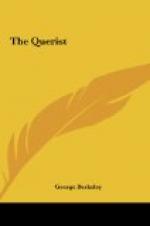132. Qu. Whether a national bank be not the true philosopher’s stone in a State?
133. Qu. Whether it be not the most obvious remedy for all the inconveniencies we labour under with regard to our coin?
134. Qu. Whether it be not agreed on all hands that our coin is on very bad foot, and calls for some present remedy?
135. Qu. Whether the want of silver hath not introduced a sort of traffic for change, which is purchased at no inconsiderable discount to the great obstruction of our domestic commerce?
136. Qu. Whether, though it be evident silver is wanted, it be yet so evident which is the best way of providing for this want? Whether by lowering the gold, or raising the silver, or partly one, partly the other?
137. Qu. Whether a partial raising of one species be not, in truth, wanting a premium to our bankers for importing such species? And what that species is which deserves most to be encouraged?
138. Qu. Whether it be not just, that all gold should be alike rated according to its weight and fineness?
139. Qu. Whether this may be best done, by lowering some certain species of gold, or by raising others, or by joining both methods together?
140. Qu. Whether all regulations of coin should not be made with a view to encourage industry, and a circulation of commerce, throughout the kingdom?
141. Qu. Whether the North and the South have not, in truth, one and the same interest in this matter?
142. Qu. Whether to oil the wheels of commerce be not a common benefit? And whether this be not done by avoiding fractions and multiplying small silver?
143. Qu. But, whether a pubic benefit ought to be obtained by unjust methods, and therefore, whether any reduction of coin should be thought of which may hurt the properties of private men?
144. Qu. Whether those parts of the kingdom where commerce doth most abound would not be the greatest gainers by having our coin placed on a right foot?
145. Qu. Whether, in case a reduction of coin be thought expedient, the uttering of bank bills at the same time may not prevent the inconveniencies of such a reduction?
146. Qu. But, whether any pubic expediency could countervail a real pressure on those who are least able to bear it, tenants and debtors?
147. Qu. Whether, nevertheless, the political body, as well as the natural, must not sometimes be worse in order to be better?
148. Qu. Whether, all things considered, a general raising the value of gold and silver be not so far from bringing greater quantities thereof into the kingdom that it would produce a direct contrary effect, inasmuch as less, in that case, would serve, and therefore less be wanted? And whether men do not import a commodity in proportion to the demand or want of it?
149. Qu. Whether the lowering of our gold would not create a fever in the State? And whether a fever be not sometimes a cure, but whether it be not the last cure a man would choose?




